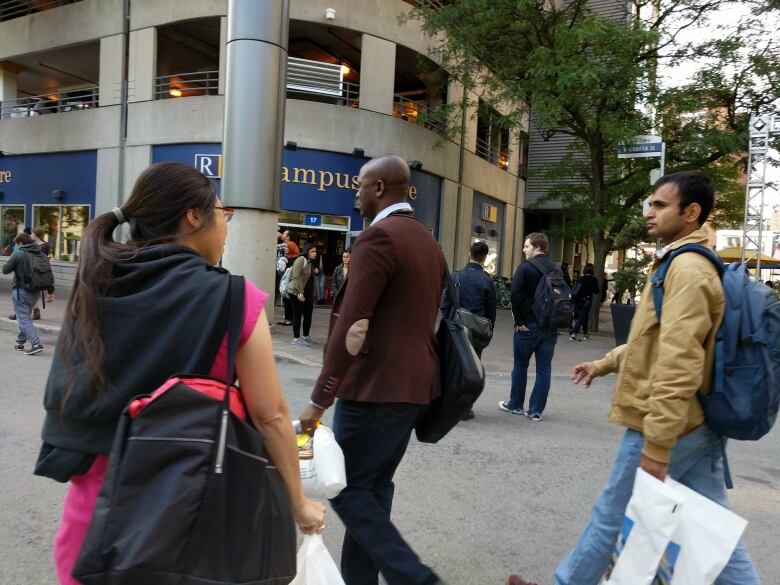Yes, post-secondary education makes you rich, but that may not be the best part: Don Pittis
Despite the aggravation, the personal and social payoff from going to university is now unequivocal

As another aggravating school year kicks in, post-secondary students must once againfacetheirmisgivingsover whether it's all worthwhile.
Parents and teachers insist that education is the credential you need to get a well-payingjob. As this week's Marketplace investigation shows, that's why people buy fake degrees.
Obviously, for professions that require special skills, credentials are important. You don't want a self-trained brain surgeonoperating on you.But the economic value of education is about more than technical training.
What's the payoff?
Education doesn'tcome with a guaranteedjob, but post-secondary students expect some kind of payoff for all the time and money invested.

And it is getting more expensive every year. While Canada's inflation rate shows average prices in the economy arerising at just over one per cent, onlylast week we found out that the cost of tuition is going up every year at about triple that rate.
Of course, what students pay is only one small part of the cost of post-secondary education. Federal and provincial governments cover the bulk ofthe costs, leading to grumpy taxpayer comments about how students nowadays aren't paying their share.
As if living on a different planet,students complain that the cost of tuition averaging $6,500 a year in 2016-17 is so high that it may never pay off, especially in the gig economy, where jobs areprecarious.
Grumpy taxpayers
To those who researchthe economics of education, what the students are worrying about, and what those getting fake degrees are trying to buy,is called the private returns of scholarship. Governments and grumpy taxpayers, whether they realizeit or notare concerned about something else. It'scalled the public returns ofeducation investment.
According to all the research by people who study such things, on both counts, education pays.

Aminority of graduates never do make much money, and a few billionaires notably Apple's Steve Jobs and Microsoft'sBill Gates didn't finish post-secondary education at all. But even when corrected forother variables such as family income, the statistical answer is clear:More education makes you richer.
The simplest way of proving the public returnto education is also based on that increase in earning power. In a graduated taxation system like Canada's, where better-paidpeople are expected to pay more,higher lifetime incomes result inhigher lifetime income tax, easily paying back the public investment.
Metamorphosis
According to Joel Harden, an education researcher at the Canadian Federation of Students, the clear public return demonstrates that taxpayers should pay a bigger share. After graduation, like thetransition from worm to butterfly, formerly impecunious students maymetamorphose intogrumpy taxpayers.
Besides the simple bookkeepingof income taxes, education offers what are sometimescalled intangible benefits that buying a degree just does not offer.
While almost every fact is now available on theinternet or available in books,experts sayformal education seems to expand peoples' awareness and help them developa more complex vision of the world. It exposes them to people outside their traditional communities. It teaches them to learn how to learn.
But there are more mysterious results.For example, studies show that getting more education makes you live longer. That offers both a private and a public dividend.
More oddly, perhaps, education also seems tomakeyou a better person. For instance, educated people volunteer more and participate in crime less.

"They tend to be more civically engaged. They tend to actually engage more with their neighbours. They are more involved parents. They're more involved in their communities. They tend to have better health," lists Erika Shaker, director of the Education Project at the Canadian Centre for Policy Alternatives, citing international research in which other possible explanations wereweeded out."They smoke less.They read to their kids more."
According to the book Re-imagining Capitalism, edited by Dominic Barton, the Canadian managing director of internationalconsultants McKinsey, higher levels of education and better income equality lead to greater innovation and thus economic benefits at all levels.
That means higher levels of educationhelpeveryone in the country by making the societyricher, fairer and healthier. There is also what's called the spillover effect as knowledge is passed on to friends and relativeswho did not themselves attend post-secondary studies.
Perhaps most important, each generation of educated people invents the economy of the future, says Charles Pascal, professor of psychology andhuman developmentat the University of Toronto's Ontario Institute forStudiesin Education.
Education opens doors young people didn't know existed, so they can create economic opportunities that don't yet exist.
"The information we requirefor careers we need in 10 years has not been invented yet," says Pascal.
And while governments are currently emphasizing the STEM subjectsscience, technology, engineering and math as essential to a modern economy,Pascal insists the fundamental valueofeducation emerges no matter what the subject studied.
"It is about ensuring the basics of citizenship, the abilityto communicate, the ability to work with peers, the ability to problem-solve and connect the dots, whichis sometimescalled creativity," he says. "These things are essential."
Follow Don on Twitter @don_pittis
More analysis from Don Pittis












_(720p).jpg)


 OFFICIAL HD MUSIC VIDEO.jpg)
.jpg)



























































































